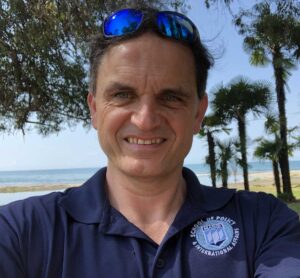
UMaine researcher studies conflict and violent extremism around the world
Bill Farrell looks at the dynamics of conflict and violent extremism. He has conducted field research in countries across Central Asia, the Caucasus region, and Africa. He has met with government officials, community leaders, stakeholders, and an array of people who have had family members and friends mobilize to violent extremism.
Farrell is an assistant professor at UMaine’s School of Policy and International Affairs, where he teaches and conducts research on issues of stability and violent extremism, with a particular interest in Salafi jihadi organizations.
A graduate of Tufts University and of the Fletcher School of Law and Diplomacy, Farrell received his Ph.D. from the University of Maine. His doctoral research comparatively examined mobilization patterns and orientation of local violent extremist organizations in the countries of Central Asia and the Caucasus, noting the change in their focus, once engaged in external jihadi theatres, such as Afghanistan and Syria.

Farrell’s research is rooted in an ethnographic approach. He spends time interviewing and gaining insights into different people’s experiences, perspectives, and thought processes. “I remember one person saying ‘my relative went off to Syria to fight, but he’s proud of our country. He loves our country. He would never do any harm here. But he believes that the Assad regime is not doing positive things for the Muslim people’…”
“In doing this research, you learn an awful lot about people’s mindset,” he explains. “You suddenly recognize that it’s not as black and white as you might otherwise think. It’s not simply terrorist versus non-terrorist. It’s perhaps somebody who thinks they’re a freedom fighter or they’re doing something heroic to save their families.”
Navigating the details of these cases is challenging. “It can be eye-opening at times. It can also be quite sad at times when we’ve talked to people who are confused by the fact that their friend was killed in Syria, and they don’t understand why he went there or what he was trying to do. You have the responsibility for not inflaming tensions and not making people feel bad, but trying to clinically understand their story,” says Farrell.
Farrell has worked with international donor agencies, non-governmental organizations, and the United States Government for more than two decades. In addition to his role at UMaine, Farrell is also Principal Consultant at Orono-based Swordfish Consulting International, LLC. At Swordfish he works globally on situation analysis, strategy formulation, and influence mapping in fragile or transitioning countries. He uses his expertise in conflict and violent extremism to help guide strategy and analysis with government, multilateral, and private sector clients.
Farrell has been focusing on topics of violence and instability for the majority of his professional and academic career. He is interested in what orients people toward violence and ways in which countries can form policy on interventions that might be taken to prevent the spread of violence or help to roll it back. For example, he has just returned from the Caucasus, where he worked with Georgian and Abkhazian civil society organizations on enhanced conflict transformation and peacebuilding skills.
Contact: research@maine.edu
Written by Ali Tobey
